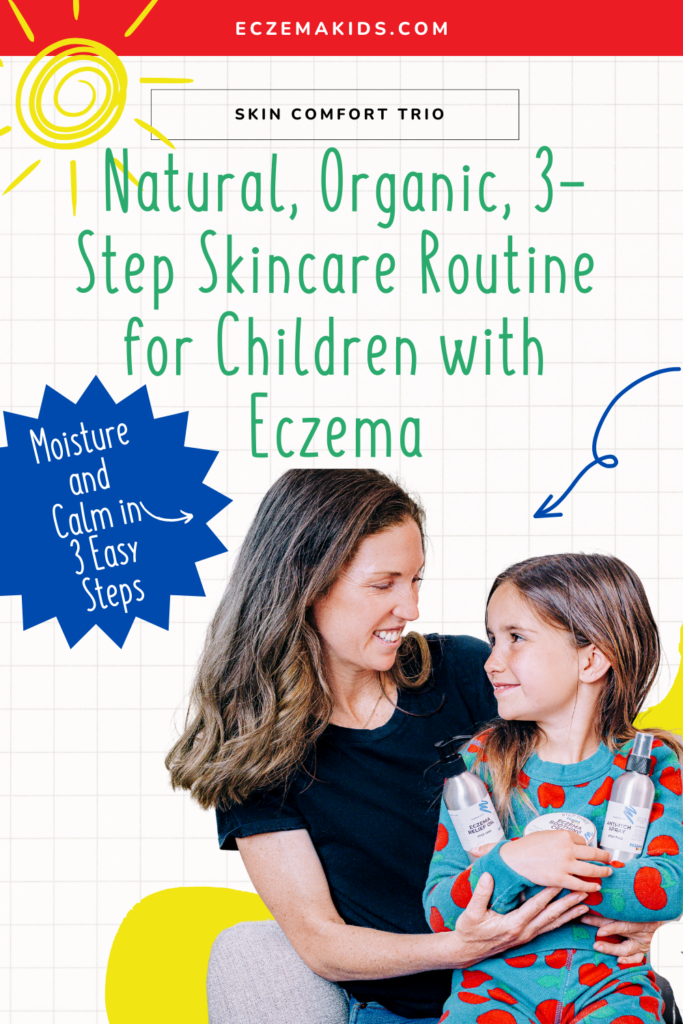Nurturing Health and Happiness
I got to take a deep dive into the gut brain connection and our kids overall health with Dr. Vaish Sarathy. She’s not only a Functional Nutrition Practitioner and Math and Science Educator but also a TEDx speaker and podcaster. Dr. Vaish comes to us with a mission close to her heart: reframing health, cognition, and optimal function for children with disabilities. Her perspective is deeply shaped by her journey as a mother to her autistic, non-speaking 16-year-old son with Down Syndrome, who happens to be a published poet and author.
In our conversation, Dr. Vaish sheds light on essential topics like optimal nutrition, inflammation-reducing practices, and supporting the gut brain connection for our children’s (and their skin) well-being.
Listen Below For The Entire Episode on The Eczema Kids Podcast
Every Child is Capable of Perfect Health
Dr. Vaish’s journey resonates deeply with many of us. When faced with little hope from conventional avenues, she researched and carved her own path for her son’s betterment.
We went through the exact same challenges when I brought my two bleeding, itchy kids to the pediatrician. It was recommended I give them bleach baths and two separate prescriptions of topical steroids. This wasn’t an acceptable “solution” for my 2 month and two year old daughter and if you’ve been around here for any length of time you know the rest of the story! Years of experimenting and trail-and-error led to a results-oriented 12 week program that will take your child from itchy and red to clear and comfortable.
Dr. Vaish and our story serve as beacons of hope and inspiration for parents navigating eczema, behavioral challenges and learning disabilities.
“A life with constraints, is more freeing in the long term than a life without constraints.” –Dr. Vaish Sarathy on the Eczema Kids Podcast
Gut Health for Our Kids
The concept of “gut health” encompasses a broad spectrum of health implications, extending far beyond mere digestion. When we delve into gut health, we’re essentially exploring the interconnectedness of various bodily functions, ranging from digestion to immune response and even neurological processes.
In essence, when we talk about the gut health, we’re addressing three key factors: indigestion, inflammation, and infection.
- Indigestion. Indigestion occurs when the body struggles to properly break down and absorb nutrients from food. This can lead to a cascade of issues, impacting not just digestion but overall health and well-being.
- Inflammation. Inflammation often arises as a response to sensitivities within the gut. When the immune system perceives a threat, it triggers an inflammatory response. Over time, chronic inflammation can wreak havoc on the body, contributing to various health conditions.
- Infection. This encompasses a wide range of potential invaders, including parasites, fungi, viruses, and bacteria. When these pathogens take hold within the gut, they can disrupt its delicate balance, leading to further complications.
It’s important to recognize that these factors are often intertwined. Indigestion can pave the way for inflammation, while inflammation can create a conducive environment for infection to thrive. Consequently, when a child experiences chronic health issues such as eczema, it’s likely that one, if not all three, of these factors are at play.
Histamine Intolerance and Eczema
The intricate relationship between gut health, microbiome diversity, and conditions like eczema and learning challenges cannot be overstated. When it comes to addressing eczema in children, optimizing gut health and promoting a balanced gut-brain axis is paramount.
One crucial aspect to consider in this regard is histamine. Histamine intolerance is increasingly recognized as a contributing factor to eczema. It’s not just about consuming obvious high-histamine foods like tomatoes and fermented products; other dietary elements can also trigger histamine release.
For instance, gluten and dairy, common staples in many diets, can provoke histamine reactions in sensitive individuals. Even if the connection between these foods and histamine might not be immediately obvious, their consumption can exacerbate eczema symptoms.
How to Minimize Histamine
Therefore, when crafting dietary interventions or protocols for children with eczema, it’s essential to adopt a holistic approach that considers not only eliminating high-histamine foods but also identifying and addressing potential triggers like gluten and dairy. By reducing histamine levels in the body, we can help alleviate eczema symptoms and promote better overall skin health.
In addition to minimizing histamine triggers, incorporating foods that support gut health is crucial. This includes fiber-rich fruits and vegetables, probiotic-rich fermented foods (with caution for those sensitive to histamine), and prebiotic sources like garlic and onions. These foods help nourish the gut microbiome, fostering a diverse and resilient microbial community that contributes to improved immune function and reduced inflammation.
Furthermore, prioritizing nutrient-dense foods rich in vitamins, minerals, and essential fatty acids can further support skin health and overall well-being in children with eczema. Omega-3 fatty acids, found in fatty fish like salmon, as well as vitamin-rich foods like leafy greens and colorful fruits, play a vital role in reducing inflammation and promoting skin healing.
Probiotics and Prebiotics for Kids with Eczema
Incorporating probiotics and prebiotics into a child’s diet is essential for nurturing a healthy gut microbiome and promoting overall well-being. However, for children with eczema, it’s crucial to be mindful of histamine levels and choose probiotic sources wisely.
When selecting probiotics, opting for strains that don’t trigger histamine release is key, especially since fermented foods may be off the table due to their potential to exacerbate symptoms. Look for probiotic supplements specifically formulated to be low in histamine or histamine-neutral.
In terms of prebiotics, herbs like marshmallow root can serve as excellent sources. Marshmallow root contains mucilage, a type of soluble fiber that acts as a prebiotic, nourishing beneficial gut bacteria and supporting digestive health. We use marshmallow root, slippery elm bark and licorice root in the Eczema Kids Prebiotic Tea. It’s a game-changer for digestive health.
Food Diversity
Maintaining food diversity is also vital for a balanced gut microbiome. Rather than eliminating all foods as a short-term solution, focus on incorporating a wide variety of nutrient-dense, whole foods into your child’s diet. This includes seasonal fruits, vegetables, gluten-free grains, beans, animal proteins, and whole-food desserts.
Embracing the seasonal bounty of whole, real foods not only provides essential nutrients but also helps inoculate the gut with a diverse array of microbes. By consuming a range of seasonal foods, you’re introducing beneficial microbes that support gut health and contribute to overall immune function.
GAPS Diet
Dr. Natasha Campbell’s groundbreaking work on the Gut and Psychology Syndrome (GAPS) diet has shed light on the profound connection between inflammatory conditions like eczema and autism. This paradigm-shifting revelation has illuminated the severity of eczema, highlighting its underlying inflammation as a key driver of symptoms. As a parent navigating the challenges of eczema in our children, this insight has sparked a newfound urgency to explore effective strategies for addressing inflammation and providing relief.
When we envision eczema as more than just a skin condition but rather as a manifestation of a compromised gut barrier, it becomes imperative to identify and eliminate foods that contribute to intestinal permeability, or “leaky gut.” Gluten, dairy, and refined sugar are common culprits known to exacerbate inflammation and compromise gut health. By removing these inflammation-causing foods from our children’s diets, we can take significant strides towards mitigating inflammation and supporting the healing process.
However, simply removing inflammatory foods may not be sufficient to address underlying gut issues comprehensively. To gain deeper insights into gut health and inflammation markers, additional diagnostic tools such as organic acid testing or stool analysis can be invaluable. These tests provide valuable information about gut microbiome composition, digestive function, and markers of inflammation, empowering us to tailor interventions more effectively.
Top Inflammation-Fighting Foods
Harnessing the power of prebiotic fiber through a diverse array of root vegetables can be a game-changer when it comes to lowering inflammation and nurturing overall well-being. These humble yet versatile veggies not only offer a plethora of health benefits but also provide a unique opportunity for palate development and sensory exploration.
Introducing a variety of root vegetables into your child’s diet not only promotes gut health but also encourages them to develop a taste for diverse flavors and textures. From earthy beets to sweet carrots and hearty sweet potatoes, each root vegetable brings its own nutritional profile to the table, enriching meals with essential vitamins, minerals, and fiber.
But it’s not just about nourishing the body; it’s also about cultivating an intelligence of the palate. By exposing children to a wide range of tastes and sensations, we empower them to develop a deeper appreciation for food and a heightened awareness of how different ingredients impact their bodies.
Furthermore, root vegetables possess soothing properties that can help calm the nervous system and promote a sense of grounding and stability. In a world filled with stimuli and stressors, incorporating these grounding foods into our children’s diets can provide a much-needed respite and support their overall emotional well-being.
Ultimately, fostering an anti-inflammatory state within the body is about more than just what we eat; it’s about embracing diversity and embracing the innate wisdom of our bodies. By incorporating a colorful array of root vegetables into our meals, we provide our children with the tools they need to thrive, both physically and emotionally.
Constipation
Dealing with constipation in children can be challenging, but having a toolkit of effective strategies can make all the difference in promoting regular bowel movements and supporting digestive health. Dr. Vaish has a constipation toolkit designed to provide practical solutions for parents facing this common issue.
One of the key principles in managing constipation is ensuring that your child has a daily bowel movement. To facilitate this, I often recommend incorporating supplements such as magnesium citrate and vitamin C into their routine. These supplements can help soften stools and promote regularity, making it easier for your child to pass bowel movements comfortably.
In addition to supplementation, it’s essential to consider potential underlying factors contributing to constipation, such as food sensitivities. Certain foods may trigger digestive discomfort and exacerbate constipation symptoms. By identifying and eliminating these trigger foods from your child’s diet, you can address the root cause of their constipation and promote long-term digestive health.
Nutritional Support for Kids with Eczema
Ensuring that our children receive the right nutrients is a cornerstone of supporting their growth, development, and overall well-being. Here are some key nutrients that parents should prioritize in their child’s diet, according to Dr. Vaish:
Omega-3s: Essential fatty acids found in foods like fish, flaxseeds, and walnuts are crucial for brain health and cognitive function.
Probiotics: Incorporating some form of probiotic, whether through supplements or fermented foods like yogurt or kimchi, can promote a healthy gut microbiome and support immune function.
B Vitamins: B vitamins play a vital role in energy metabolism, neurological function, and overall vitality. Incorporating foods rich in B vitamins, such as leafy greens, whole grains, and lean meats, is essential.
Vitamin D: Adequate vitamin D is crucial for bone health, immune function, and mood regulation. While sunlight is a primary source of vitamin D, incorporating foods like fortified dairy products, fatty fish, and eggs can help ensure sufficient intake.
Curcumin: The active compound in turmeric, curcumin, boasts powerful anti-inflammatory properties. Adding turmeric to dishes, along with a hint of pink peppercorn to balance histamine levels, can help combat inflammation and support overall health.
Managing Food Choices in the Home
Managing food choices in the home can be a daunting task, especially with older children who may spend more time away from home. Dr. Vaish acknowledges the challenge but emphasizes the importance of prioritizing nutritious options whenever possible. While her family may have varying dietary preferences, her son thrives on an idealized diet tailored to his needs.
When it comes to favorite health-promoting recipes, Dr. Vaish highlights the versatile dosa, a fermented grain crepe paired with nourishing vegetable soup. These staples in her household not only provide essential nutrients but also showcase the beauty of wholesome, flavorful ingredients.
Navigating dietary choices can be a journey filled with challenges, but Dr. Vaish reminds us of the profound impact that proper nutrition can have on our children’s lives. From regulating emotions to fostering focus and vitality, the benefits of nourishing our children well extend far beyond their plates. By embracing the discipline of healthy eating, we empower our children to thrive and set them on a trajectory of lifelong wellness.
If you’re looking for more direction in nourishing your kids with eczema and overcoming nutritional deficiencies, check out Springtime Diet Tips for Kids, Unsuspected Eczema-Triggering Foods AND What to Eat Instead and Foods to Avoid While Treating Eczema. For eczema-safe recipes become a member of the Natural Eczema Solutions for Kids Facebook Group.


FAQ
How does gut health affect children’s overall well-being?
Gut health plays a crucial role in children’s overall well-being, influencing everything from digestion and nutrient absorption to immune function and even mood regulation. A healthy gut microbiome, composed of a diverse array of beneficial bacteria, helps maintain a balanced immune response, protects against harmful pathogens, and supports the production of essential vitamins and neurotransmitters.
What are the benefits of a natural skincare routine for children with eczema?
A natural skincare routine for children with eczema offers several benefits, including reduced exposure to harsh chemicals and irritants commonly found in conventional skincare products. Natural ingredients can help soothe inflammation, hydrate the skin, and support overall skin health without causing further irritation. Check out the three-step, Skin Comfort Trio. It’s the easiest first step towards healing to take!
